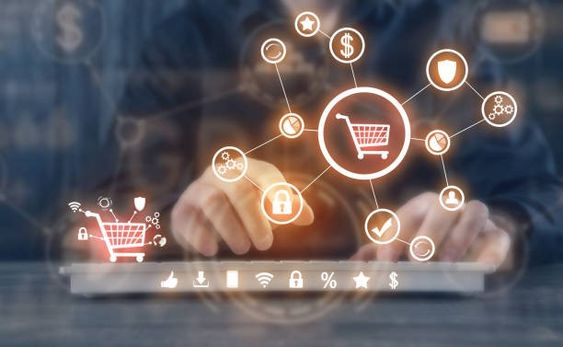The Transformative Role of Technology in E-commerce
In the digital age, technology is the backbone of e-commerce, driving growth, innovation, and efficiency. This blog delves into the various technological advancements that have revolutionized e-commerce, highlighting key innovations and trends shaping the industry’s future.
E-commerce has undergone a significant transformation over the past few decades, largely driven by technological advancements. From the early days of online shopping to the current era of mobile commerce and AI-driven personalization, technology has been at the heart of e-commerce evolution. This blog will explore how different technologies are impacting e-commerce, making it more efficient, customer-friendly, and innovative.

The Evolution of E-commerce Technology
- Mobile Commerce (M-commerce)
With the proliferation of smartphones and the advent of high-speed internet, mobile commerce has become a cornerstone of EC. M-commerce enables consumers to shop anytime, anywhere, enhancing convenience and accessibility. Key features of mobile commerce include:
- Mobile-optimized websites: Ensuring that websites are responsive and user-friendly on mobile devices is crucial. A mobile-optimized site offers a seamless browsing and shopping experience, which is essential for retaining mobile shoppers.
- Mobile payment solutions: The integration of secure payment gateways such as Apple Pay, Google Wallet, and PayPal has simplified the checkout process, making transactions quick and secure.
- Augmented Reality (AR): AR technology allows customers to visualize products in their environment before making a purchase. For instance, furniture retailers can use AR to let customers see how a piece of furniture would look in their home.
- Artificial Intelligence (AI) and Machine Learning (ML)
Artificial intelligence (AI) and machine learning (ML) are revolutionizing by providing personalized shopping experiences and improving operational efficiency. Key applications of AI and ML in EC include:
- Personalized recommendations: AI algorithms analyze customer behavior and preferences to suggest products tailored to individual needs. This personalized approach can significantly enhance customer satisfaction and increase sales.
- Chatbots and virtual assistants: These AI-driven tools provide instant customer support, answering queries and assisting with purchases in real-time. This not only improves customer service but also reduces the burden on human support staff.
- Inventory management: Machine learning algorithms can predict demand patterns, helping businesses optimize stock levels and reduce wastage. This ensures that popular products are always in stock, improving customer satisfaction.

- Big Data Analytics
The utilization of big data analytics allows EC businesses to make data-driven decisions. By analyzing vast amounts of customer data, companies can gain valuable insights into consumer behavior, market trends, and sales performance. The benefits of big data analytics include:
- Customer segmentation: Identifying and targeting specific customer groups with tailored marketing campaigns can improve conversion rates and customer loyalty.
- Predictive analytics: Forecasting future sales and trends helps businesses make informed decisions about inventory, marketing, and pricing strategies.
- Enhanced user experience: By personalizing website content and offers based on user preferences and behavior, businesses can provide a more engaging shopping experience.
- Blockchain Technology
Blockchain technology is gaining traction in EC due to its potential to enhance security, transparency, and trust. Key benefits of blockchain include:
- Secure transactions: Blockchain ensures secure and tamper-proof transactions through decentralized ledgers, reducing the risk of fraud.
- Supply chain transparency: Blockchain provides visibility into the supply chain, allowing consumers to track products from production to delivery. This transparency builds trust and can enhance brand reputation.
- Smart contracts: These self-executing contracts automatically enforce terms and conditions, reducing the need for intermediaries and speeding up transactions.
- Internet of Things (IoT)
The Internet of Things (IoT) connects everyday objects to the internet, enabling them to send and receive data. In EC, IoT applications include:
- Smart inventory management: IoT sensors can monitor stock levels in real-time and automate reordering processes, ensuring that businesses never run out of popular products.
- Enhanced logistics: IoT devices can improve delivery tracking and optimize routes for faster and more efficient shipping, enhancing the overall customer experience.
- Personalized marketing: By collecting data from IoT devices, businesses can deliver personalized marketing messages and offers to customers based on their preferences and behavior.
The Future of E-commerce Technology
As technology continues to evolve, the EC industry is poised for even greater innovation. Emerging technologies such as virtual reality (VR), 5G connectivity, and voice commerce are set to further revolutionize the online shopping experience. Here’s how these technologies could shape the future:
- Virtual Reality (VR): VR can create immersive shopping experiences, allowing customers to explore virtual stores and interact with products in a simulated environment.
- 5G Connectivity: The rollout of 5G networks will provide faster and more reliable internet connections, enhancing mobile commerce and enabling more advanced applications.
- Voice Commerce: With the increasing popularity of voice-activated assistants like Amazon’s Alexa and Google Assistant, voice commerce is becoming a new frontier in EC. Customers can make purchases using voice commands, making shopping more convenient.
Technology is the driving force behind the rapid growth and transformation of the
ecommerce industry. By leveraging innovations such as mobile commerce, AI, big data analytics, blockchain, and IoT, businesses can enhance their operations, improve customer experience, and stay ahead of the competition. As we look to the future, the continued integration of cutting-edge technologies will undoubtedly shape the next era of EC, offering exciting opportunities for businesses and consumers alike.
Related articles: View here.
